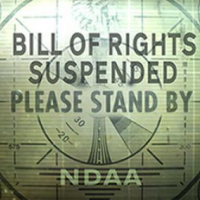California Bucks Feds on Two Fronts: Deportation and Detention
 (graphic: occupy.com)
(graphic: occupy.com)
State lawmakers and Governor Jerry Brown made it a little harder last week for the U.S. to deport undocumented immigrants in California and the military to place people it claims are terror-related suspects in indefinite detention without charges or trial.
Brown signed Assembly Bill 4, the Trust Act, on Saturday, limiting local cooperation with the U.S. Immigration and Customs Enforcement (ICE) by not automatically running immigration checks on everyone they suspect is in the states illegally and not holding immigrants they wouldn’t otherwise hold. The governor vetoed a similar measure last year that lacked AB 4’s list of serious felonies that would keep people in custody.
The day before, Brown signed Assembly Bill 351, overwhelmingly approved by the Senate and Assembly, which forbids state officials from cooperating with federal authorities who seek to use the 2012 National Defense Authorization Act (NDAA) (pdf) to detain U.S. citizens and people lawfully in this country. The bill, otherwise known as the California Liberty Preservation Act, was authored by Tea Party Republican Assemblyman Tim Donnelly.
The California law actually goes beyond prohibiting cooperation with federal authorities in enforcement of the NDAA provision. It directs state agencies, political subdivisions, employees and members of the California National Guard on official state duty from helping any agency of the U.S. military enforce any federal laws that allow such detention.
The 2012 NDAA, which is a budget and expenditures law, codifies authority given to the federal executive branch by Congress in the Authorization for Use of Military Force (AUMF), passed after the attack on September 11, 2001. The AUMF has been used to justify a range of policy decisions, including the use of drones. In this case, it gives the government authority to detain people it considers supportive of terrorism.
The act effectively short-circuits the use of a habeas corpus writ, which allows a detainee to petition for a court hearing. Habeas corpus has been a touchstone of Anglo-Saxon jurisprudence for a thousand years, and is explicitly protected by the U.S. Constitution. The U.S. Supreme Court has written that habeas corpus “is the fundamental instrument for safeguarding individual freedom against arbitrary and lawless state action.” The Latin phrase means “bring me the body” and is a judicial directive generally not taken lightly by law enforcement.
The law was opposed by the California Attorneys for Criminal Justice (CACJ), which argued that the state shouldn’t be messing around with a federal law whose shortcomings are best dealt with in the federal courts. But the courts haven’t made much headway in clarifying the situation.
Judges and justices have issued preliminary and permanent injunctions, argued about the meaning of the law, and argued about who can argue about the law. The U.S. Supreme Court has weighed in on some of these judicial machinations, but the bottom line is, right now, the threat of indefinite detention of U.S. citizens is real.
The California resolution won’t change that, and neither will resolutions pending in other state legislatures.
–Ken Broder
To Learn More:
Governor Signs Batch of Immigration Bills (by Caleb Garling, San Francisco Chronicle)
Governor Signs California Indefinite Detention Nullification Bill (by Joe Wolverton II, The New American)
California Governor Signs Ban on NDAA Detentions (by Jason Ditz, AntiWar.com)
Gov. Brown, ACLU and Tea Party Conservative Agree on a Bill (by Patrick McGreevy, Los Angeles Times)
Senate Approves Indefinite Military Detention of U.S. Citizens in U.S. (by Noel Brinkerhoff, AllGov)
NDAA (American Civil Liberties Union)
- Top Stories
- Controversies
- Where is the Money Going?
- California and the Nation
- Appointments and Resignations
- Unusual News
- Latest News
- California Forbids U.S. Immigration Agents from Pretending to be Police
- California Lawmakers Urged to Strip “Self-Dealing” Tax Board of Its Duties
- Big Oil’s Grip on California
- Santa Cruz Police See Homeland Security Betrayal in Use of Gang Roundup as Cover for Immigration Raid
- Oil Companies Face Deadline to Stop Polluting California Groundwater





